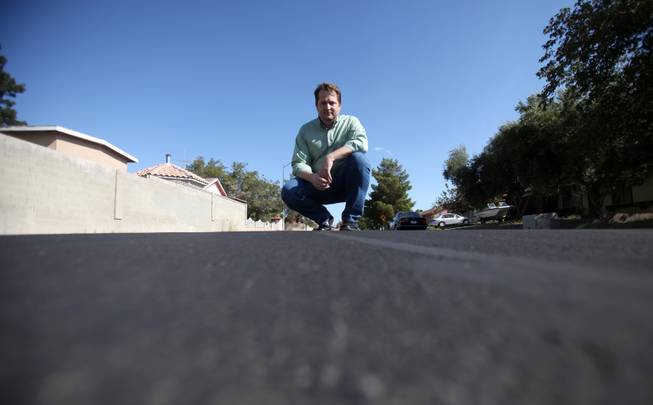
Martin Dean Dupalo poses in his East Las Vegas neighborhood. He is pushing for the city to regulate mobile billboards that have been rolling through the area, near Charleston and Nellis boulevards.
Saturday, Sept. 19, 2009 | 2:10 a.m.
Reader poll
Sun Archives
- Should they be banned? (3-27-2009)
- Billboards on trucks to face a review (4-8-2008)
- Jeff Simpson on why mobile billboards are worse than an eyesore (3-26-2006)
- LVCVA uses mobile billboards (8-23-2004)
- Deal on wheels: Vehicle owners earning income, glances with decorated rides (8-30-2001)
Eyesores on the Strip?
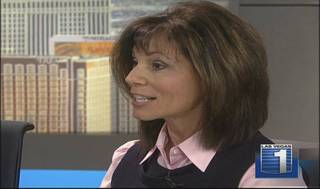
Viewing video requires the latest version of Adobe's Flash Player
The East Las Vegas neighborhood where Martin Dean Dupalo has lived since the age of 12 has seen its share of challenges in the past two decades. The area near Nellis and Charleston boulevards has had issues with crime, homelessness — you name it, it seems, and Dupalo has a story to tell.
But while some of the problems saunter down the narrow streets and cul-de-sacs on two legs, Dupalo's latest concern has four wheels and a scantily clad message: The mobile billboards tourists see cruising the Strip and commercial corridors have rolled into his neighborhood. And Dupalo is steamed.
"To someone like myself, it's inappropriate in a neighborhood," he said. "Highly inappropriate."
Dupalo, a political science professor at UNLV, said one day a few months ago he noticed a mobile billboard trolling the streets near his house, advertising, in Spanish, for "hot Latinas."
While he admits he didn't appreciate what the ad was selling, he said he was most perturbed by how it was being sold — on the back of a truck he says isn’t suitable for the streets of his residential area.
"Let's just keep it to, in general terms, to the Strip, some of these outlying areas, and the commercial zones,” he said. “Certainly not in neighborhoods.”
At Dupalo's prodding, Las Vegas Mayor Pro Tem Gary Reese brought an ordinance before the City Council that takes a stab at regulation — putting limits on where and for how long the vehicles can be parked.
"There should be a home for these billboards to go to every night and be parked. During the day, I don't want to see them parked anywhere for over, say, five minutes,” Reese said. “I don't think that's what the pretext of a mobile board is.”
The ordinance had its first reading in front of the City Council this past week. If approved, it would prohibit parking a mobile billboard within 500 feet of a single-family dwelling, making it a misdemeanor punishable by a fine of up to $1,000 or six months in jail.
Down a slippery slope?
The proposed ordinance has the support of Marla Letizia, the owner of Las Vegas-based Big Traffic Mobile Billboards. Big Traffic, which has 80 employees and 13 trucks, is the second-largest mobile billboard company in the country.
Letizia is hungry for a rule book for the nascent industry — she proposed an ordinance years ago with hopes of county regulation, but it didn't go anywhere.
"It's hurting me that there isn't regulation," she said.
She said she is frustrated by what she called "one-truck wonders" operated by some adult clubs and escort services that, at the end of the day, are parked in peoples' yards or in front of their homes, as opposed to a commercial truck yard. Efforts to reach the owner of the adult club advertising in Dupalo's neighborhood were unsuccessful.
The proposed Las Vegas ordinance is similar to that of Henderson's, which prohibits such vehicles from being parked. In North Las Vegas, there are no restrictions as to where the trucks can travel when on a public street, said business license manager Linda Hammond.
"They're still relatively new," she said.
At the county level, Commissioner Chris Giunchigliani said the proposed Las Vegas ordinance could cause more problems than it solves. The way she reads it, mobile billboards already are illegal under state law.
"To me, you go down a slippery slope if you regulate something that isn't even permitted in the first place because then they will be perceived to have a right, maybe, for lack of a better term, to do business," she said.
With mobile advertising in her crosshairs, Giunchigliani took her concerns earlier this year to the Legislature. She pushed for a blanket ban on the trucks — noting, all the while, that she believes the trucks already are illegal but that the problem is with enforcement.
"Part of this is just getting people to enforce what's there. Very truthfully, Metro doesn't have the time to stop and check the trucks. They've got more important things to do," she said.
The proposed bill was never introduced. But she's still lobbying against them, calling her effort, for now, a grassroots one.
She cited complaints about the trucks from constituents and from tourists in her quest to quash the mobile billboards, calling them eyesores that do nothing more than clog roads and cause problems. In her opinion, whatever they're selling, where the trucks should be allowed is nowhere.
"I do get people who call because now they're going into neighborhoods with more of the risque stuff. I get calls from some parents who are very upset about that part of it,” she said. “But that part is what's covered under the First Amendment, and that's why I don't want to get into regulating them — it's not an issue of what's on the billboard, it's an issue of where they should be permitted to be."
Allen Lichtenstein, general counsel for the American Civil Liberties Union of Nevada, has said the passage of legal action regulating billboards could be tough in the state. Hawaii has successfully banned such trucks at the state level, but that might not work in Nevada, he said.
"In terms of looking at the justification, and how well it fits that justification, it's a very different justification to say we want to keep natural beauty unsullied than it is to say we want to look at these groups of businesses and favor them and get rid of advertising that might not be for them but for somebody else," he said earlier this year on “Face to Face with Jon Ralston.”
Some jurisdictions — Austin, Texas, for example — have enacted a successful ban at the local level. But a Collier County, Fla., ordinance was overturned after a judge ruled a mobile billboard ban was unconstitutional. The county paid a company $225,000 in lost revenue.
‘Last bastion of normal life’
Dupalo says what he’s hoping for isn't that drastic. He said he sees the truck parking ordinance as a first step toward regulation. The second step, he said, is to draft legislation to keep them out of neighborhoods completely.
"Neighborhoods are not fair game at any point. That's my big thing – neighborhoods,” he said. “That's the last bastion of just normal, family life in Las Vegas.”
But Letizia said defining what areas are strictly residential could be difficult because many roadways in Clark County have both residential and commercial areas.
"Our cargo is an advertisement and we have as much right to be on those streets as anybody," she said.
She said her trucks, which don't carry advertising for adult services, mostly keep to the main roads. That's where they attract the most eyeballs.
"We stay on the major thoroughfares because the more visual impressions we get, the more successful our clients are,” she said. “If we drove down your residential street, how many people would see it? One? Two? We'd be losing thousands of impressions by being in your neighborhood."
Dupalo's neighborhood
Dupalo’s neighborhood is still a place where children play in the streets — football when he was a kid, now soccer. He said he's determined to improve its quality of life, despite the neighborhood's struggles.
Worried about speeders, he worked to get speed bumps installed in front of his house. Concerned about drunken drivers and the bevy of alcohol outlets near his home, he took on a fight with the Walmart at 210 N. Nellis Blvd., which wanted to sell liquor. He won. There's a Neighborhood Watch, gates by the washes and safety measures along the trails. Dupalo, who lives in the house he inherited from his father, who bought it in 1980, takes some of the credit.
"I know I should move. I understand that. But it's my neighborhood and I'm vested. It's changed dramatically; it has a lot of challenges, and this (the billboards) is certainly one of them," he said. "But if I don't fight for it, who’s going to fight for it?"
After losing some high-profile battles (such as cases involving hand billing for erotic services on the Strip), local governments have been reluctant to touch on the content of advertising. So Dupalo is honing in on safety issues.
He said he's already in talks with Las Vegas City Attorney Brad Jerbic on an ordinance prohibiting mobile billboards in residential areas altogether. The parking ordinance, Dupalo said, is the first step.
"This is not an attack on the First Amendment,” he said. “This is a 'protecting my neighborhood' issue.”
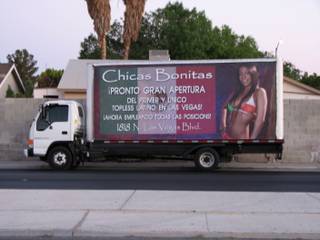
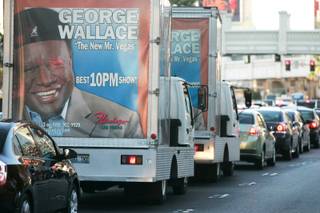
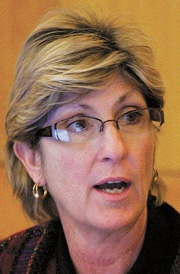

Join the Discussion:
Check this out for a full explanation of our conversion to the LiveFyre commenting system and instructions on how to sign up for an account.
Full comments policy